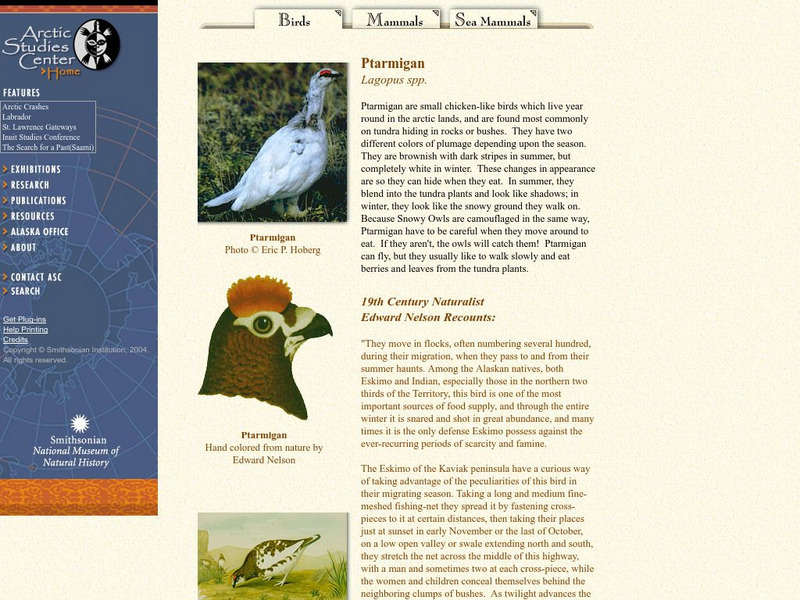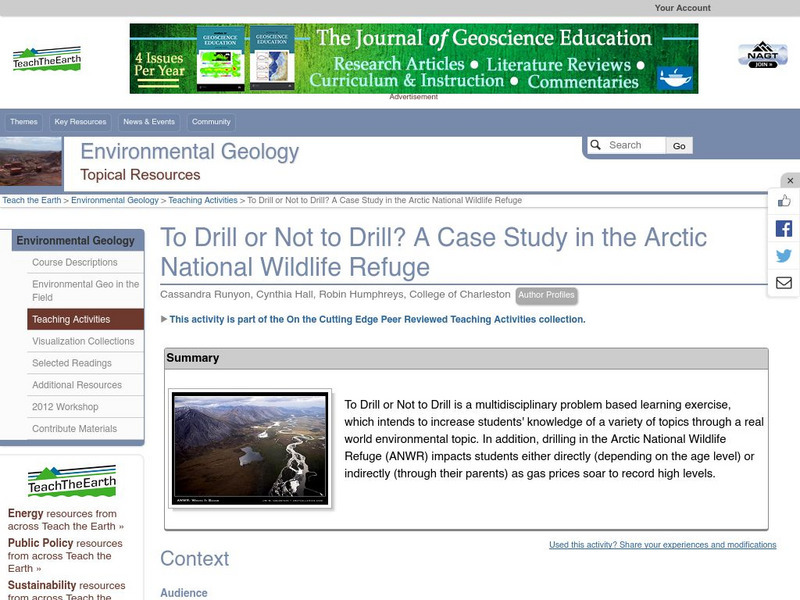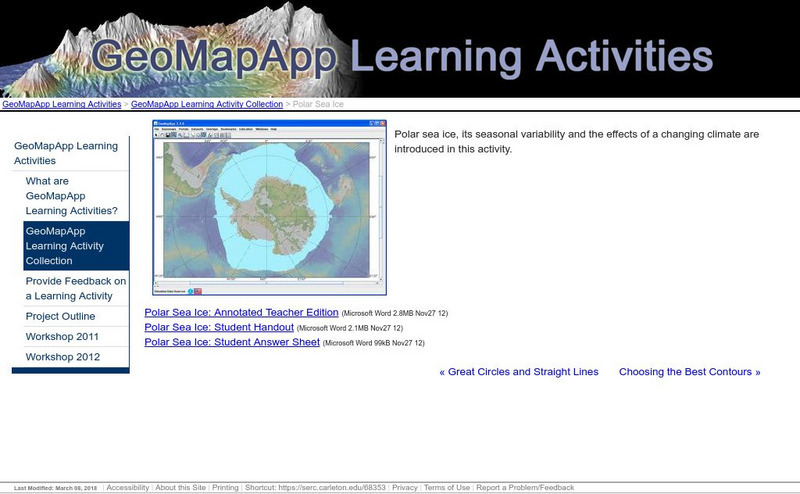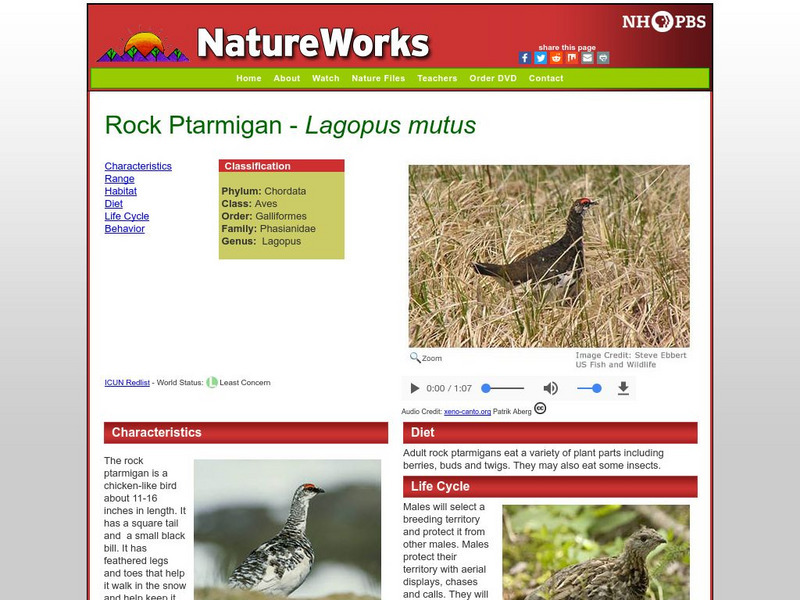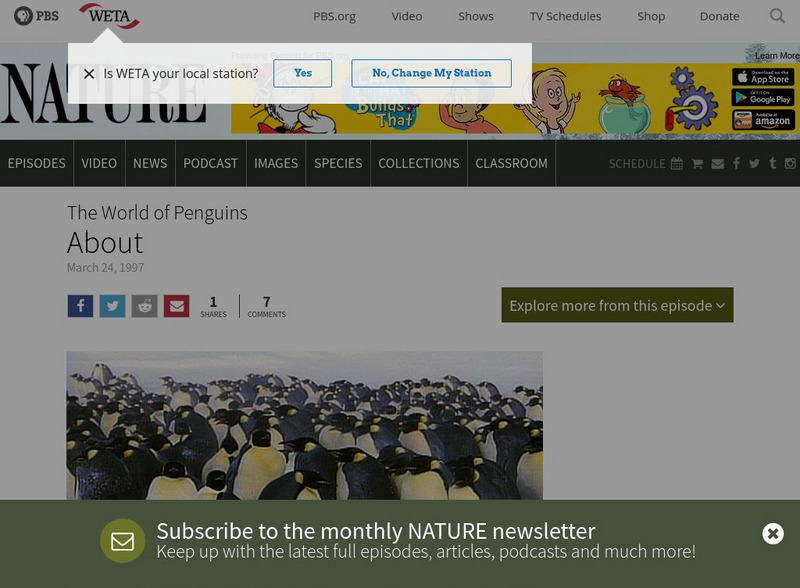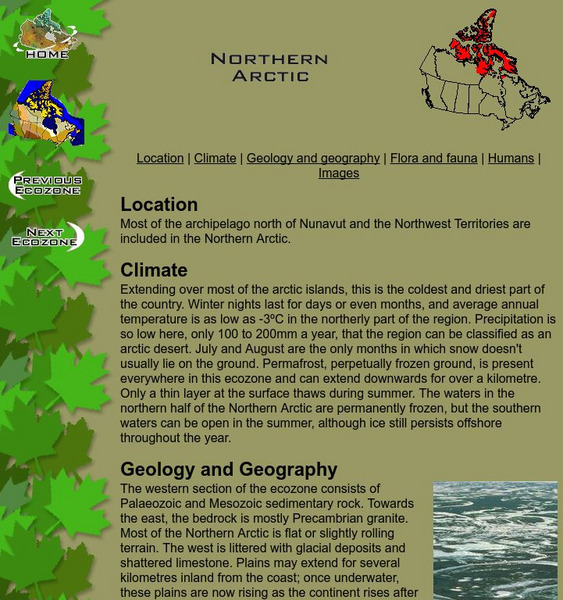Canadian Wildlife Federation
Hinterland Who's Who: Muskox
Get the facts about the muskox. Besides finding a detailed description of this resident of Canada?s arctic tundra, you?ll also learn about some of its unique facts and characteristics. Also included in this Mammal Fact Sheet on the...
US Navy
The Navy Travels to the Poles
Learn about the exploration of the polar regions by the U.S. Navy. Links to various activities are found on the site.
Smithsonian Institution
National Museum of Natural History: Ptarmigan
This Smithsonian website has a brief, but thorough, article on the Ptarmigan. It also includes pictures and an extensive quote from 19th Century naturalist Edward Nelson.
NOAA
Noaa: Where Will the Polar Bears Go? [Pdf]
Get to know polar bears and learn why it is important for them to live in the current arctic conditions. Make a poster that demonstrates your understanding of how climate change in the arctic could affect polar bears and humans.
Smithsonian Institution
National Museum of Natural History: Looking Both Ways
This is an interactive exhibit from the Smithsonian Arctic Studies Center featuring the Alaskan Native Alutiiqs. Learn much information about the people, their culture, and see where they live.
Science Education Resource Center at Carleton College
Serc: To Drill or Not to Drill? Case Study in Arctic National Wildlife Refuge
This lesson intends to increase students' knowledge of a variety of topics through a real world environmental topic.
BBC
Bbc News: Regions and Territories: Greenland
Article providing a general overview of Greenland, the world's largest island, focusing on its history, country facts, political leaders, and news media. Provides links to a timeline of key events, recent news articles, and related...
Other
Polar Continental Shelf Project for Kids!
Visit this resource to learn about the geography, wild life, plants and people of Polar Continental Shelf in Canada's Arctic. Students can take a quiz to see how much they have learned.
Smithsonian Institution
National Museum of Natural History: Muskox
This site takes a very brief look at the muskox as an arctic creature. Several photographs are also provided.
Other
Unmuseum: Virtual Exploration Society: Matthew Henson
Read the exciting account of Matthew Henson's explorations of the Arctic region and his assault on the North Pole.
Sesame Street
Sesame Street Games
These interactive games allow young children to explore the jungle, the oceans and the arctic regions. Children can look for animals in that area of the world.
Central Intelligence Agency
Cia: World Factbook: Regional and World Maps
Maps of major areas of the world can be downloaded here. The maps have excellent detail and are in color.
Smithsonian Institution
National Museum of Natural History: Laysan Albatross
This Smithsonian website has a brief, but thorough, article on the Laysan Albatross that also includes a picture.
PBS
Pbs Learning Media: A Subsistence Culture Impacted by Climate Change
This short video explains how warmer temperatures in the Arctic are transforming the ecosystem and affecting the Athabaskan people, threatening their way of life. [2:59]
Science Education Resource Center at Carleton College
Serc: Polar Sea Ice
Polar sea ice, its seasonal variability, and the impact of a changing climate are investigated in this activity. Students will also explore the differences between polar regions that result from Antarctica being a continent and the north...
ClassFlow
Class Flow: Continental Regions
[Free Registration/Login Required] A flipchart showing the different regions of the world: hot deserts, tundra, equatorial rainforest, Mediterranean, and also Irish landscapes. Some activities are included to present the vocabulary...
National Earth Science Teachers Association
Windows to the Universe: Warming of the Polar Regions
Learn about the climate in the Polar regions and how it is affected by global warming. Links to related material.
Missouri Botanical Garden
Missouri Botanical Garden: Tundra Animals
Explore this comprehensive resource on the birds and mammals of the tundra. This resource features information such as diet, class, order, size, habitat, conservation range and the like.
PBS
Nh Pbs: Nature Works: Rock Ptarmigan
Discover how the Rock Ptarmigan lives in the Tundra when you check out this site. This resource features photographs, information on characteristics, life cycle and more.
Enchanted Learning
Enchanted Learning: Polar Bears
Learn more about the polar bear when you visit this informative site that features a diagram of the polar bear and information on its diet, habitat, anatomy, reproduction and so on.
BBC
Bbc Science & Nature: Reindeer
The BBC provides this photo-illustrated fact sheet about the Reindeer. Once found throughout the northern latitudes, these animals are now only found in herds in Alaska, Canada, Scandinavia and Russia.
PBS
Pbs Nature: Penguins
Did you know that penguins can survive for more than 100 days without food or water? Discover more educational facts about these fascinating birds when you explore this site.
PBS
Pbs: Nature: The World of Penguins
What do you know about the world of penguins? This PBS site features information about these flightless birds. Come and check out this extraordinary resource.
McGill University
Mc Gill University: Canadian Biodiversity: Ecozones: Northern Arctic
A brief, concise description of the chain of islands that form most of the archipelago north of Nunavut and the Northwest Territories. It includes an excellent collection of images of the landscape as well as those of animals and birds...




